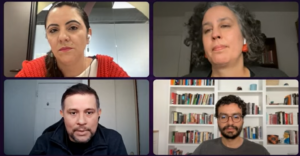When one hears the word mercenary, the image that usually comes to mind is of a man dressed in fatigues, on the ground, armed and ready for anything. However, in today's digital era, many mercenaries go unnoticed while they act as disinformation ringleaders in Latin America.
The work of these individuals is the subject of the project "Digital Mercenaries" — a cross-border and collaborative network of news outlets from Argentina, Bolivia, Brazil, Chile, Colombia, Costa Rica, Spain, United States, Guatemala, Honduras, Mexico, Nicaragua, Paraguay, Peru, Uruguay, and Venezuela. Their work is coordinated by the Latin American Center for Investigative Journalism (CLIP, by its Spanish acronym).
According to this project, mercenaries are consultants who export misleading political agendas. These political communication experts not only help politicians to look more attractive and charismatic, but also use digital strategies, based on fear and hatred, to change the media agenda and voters’ opinions.
In June 2022, journalist Pablo Medina attended a workshop on Open Source Intelligence (OSINT) in San José, Costa Rica. He met several Central American journalists who were receiving attacks on social media, through profiles that seemed to be linked to their countries’ governments.
This coincidence made them question who was behind these attacks and disinformation on social media. "Several journalists who were at the workshop realized they were receiving attacks, with the same hashtags and formulas.... We thought there were probably people selling those strategies in several countries at the same time," Medina told LatAm Journalism Review (LJR).
After these initial conversations, in December 2022, they began their investigation with financial support from Free Press Unlimited, the Networks Against Silence (ASDI) program, Seattle International Foundation, and Rockefeller Brothers Fund. The result is condensed in a web page with more than 15 reports and a documentary, and at the same time each media published individually in their portals.
"We were rather very optimistic [with this project]. We wanted to cover all of Latin America because we suspected, from what we had seen, that political consultants were working throughout the region. So we tried to find allies in all Latin American countries and also in the United States and Spain," Medina explained.

"Mercenarios Digitales" is a cross-border, collaborative alliance of media from Latin America, the United States and Spain coordinated by the Centro Latinoamericano de Investigación Periodística (CLIP). (Photo: Screenshot).
Not only the media participated in this investigation, but also civil society organizations such as Cazadores de Fake News (Venezuela), Fundación Karisma (Colombia), Interpreta Lab (Chile), Lab Ciudadano (Honduras), and DFRLab (USA). Also students of the master's course Using Data to Investigate Across Borders with professor Giannina Segnini (Columbia University, USA).
"Compared to other disinformation investigations we’ve done at CLIP, this one’s impact has been huge. Not only because of the interest of colleagues in all countries, but also because of the interest among civil society, academics," journalist and project co-coordinator José Luis Peñarredonda told LJR.
"I had a personal concern that was a bit pessimistic. I was under the impression this was an issue only journalists cared about, but the response to this investigation shows that’s not necessarily the case. More and more people are concerned and see disinformation as a major problem," he added.
During the months of investigation, the journalists attended political communication summits to get sources and understand how disinformation works within political consulting.
They also used one of the main tools of investigative journalism known as 'follow the money,' which consists of uncovering hidden practices by following the money through payments, purchases, transfers, etc.
"CLIP’s initial approach to the topic, which was unusual before, was to see disinformation as a business," Medina said. One of the feature stories that followed the money trail was entitled Neuron, a deception factory for Latin America’s Left. It was about the consulting firm Neurona and its founder, the Mexican César Hernández, who fed a network of disinformation through the creation of informative or news websites.
This type of investigation has allowed fact-checkers to play a more active role in the fight against disinformation. "This is like cutting off the head of a hydra. That is, when you finish with one, you get three more. So now we want to go further back, deeper, to see what creates disinformation and not so much attacking it when it’s already happening," Medina said.
The publication of this investigation also coincided with elections in several countries in the region: Ecuador, Mexico, Argentina, and Guatemala. So, according to the coordinators, good timing could have contributed to the project’s success.
However, coordinators feared its journalistic impact could spark unwanted reactions.
"Security was a concern because we’re investigating people whose job, or part of their job, is to harass people on social media. So we thought it might happen to us. Therefore, we tried to take some security measures beforehand," Peñarredonda said.
Some of the digital security measures or measures taken were: Signing some stories using only the news outlet’s name, sending questions to those involved through non-personal emails, and doing a legal review of the stories before publication to avoid possible legal harassment.
Collaborative work has also become another safety feature in journalism.
"Working in partnership allows for the riskiest things to be done from a different country. That also helps stories to turn out better," Peñarredonda said. "Working with colleagues from other countries, not only with journalists, opens your mind a lot and let’s you really understand how to approach the phenomena."
Banner: Illustration created by Miguel Méndez for the Digital Mercenaries project.